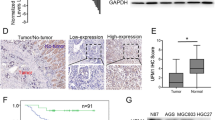Abstract
Background
Raf-1 kinase inhibitor protein (RKIP) inhibits Raf (a key element in the ERK/MAPK pathway) and is regarded as anti-tumoral. In contrast, 14-3-3 is considered protumoral. However, the pathogenetic role of RKIP and 14-3-3ε in gastric cancer is unclear.
Aim
The purpose of this study was to examine the influence of 14-3-3ε and RKIP on SGC7901, the regulation of the ERK/MAKP pathway by both, and the interaction between the two proteins.
Methods
RKIP and 14-3-3ε genes were introduced into SGC7901 cells using gene cloning technique, then, the bioactivities including the proliferation, migration and invasion of the cells were assessed by MTT and migration assays. ERK/MAKP pathway’s activity was examined using real-time quantitative RT–PCR, western blot, immunoprecipitation and 3D-immunolocalization techniques.
Results
Our results showed that RKIP inhibited SGC7901 cells’ bioactivities whereas 14-3-3ε upregulated them through the involvement of the ERK/MAPK pathway. RKIP inactivated this pathway, but 14-3-3ε activated it. RKIP and 14-3-3ε were co-localized in the cells and interacted with each other; this attributed to their opposite influence on the ERK/MAPK pathway and the cells bioactivities.
Conclusions
The ERK/MAPK pathway is involved in the pathogenesis of gastric cancer; RKIP and 14-3-3ε exert an opposite effect on this pathway and the cells possibly via both direct and indirect reactions with the elements in this pathway. The interaction between RKIP and 14-3-3ε may also contribute to their pathogenetic roles in gastric cancer.



Similar content being viewed by others
References
Alberts SR, Cervantes A, Velde CJH. Gastric cancer: epidemiology, pathology and treatment. Ann Oncol. 2003;14:ii31–ii36.
Seddiqi N, Bollengier F, Alliel PM, et al. Amino acid sequence of the Homo sapiens brain 21–23-kDa protein (neuropolypeptide h3), comparison with its counterparts from Rattus norvegicus and Bos taurus species, and expression of its mRNA in different tissues. J Mol Evol. 1994;39:655–660.
Odabaei G, Chatterjee D, Jazirehi AR, Goodglick L, Yeung K, Bonavida B. Raf-1 kinase inhibitor protein: structure, function, regulation of cell signaling, and pivotal role in apoptosis. Adv Cancer Res. 2004;91:169–200.
Avruch J, Khokhlatchev A, Kyriakis JM, et al. Ras activation of the Raf kinase: tyrosine kinase recruitment of the MAP kinase cascade. Recent Prog Horm Res. 2001;56:127–155.
Hilger RA, Scheulen ME, Strumberg D. The Ras–Raf–MEK–ERK pathway in the treatment of cancer. Onkologie. 2002;25:511–518.
McCubrey JA, Steelman LS, Chappell WH, et al. Roles of the Raf/MEK/ERK pathway in cell growth, malignant transformation and drug resistance. Biochim Biophys Acta. 2007;1773:1263–1284.
Li HZ, Gao Y, Zhao XL, et al. Effects of Raf kinase inhibitor protein expression on metastasis and progression of human breast cancer. Mol Cancer Res. 2009;7:832–840.
Fu Z, Kitagawa Y, Shen R, et al. Metastasis suppressor gene Raf kinase inhibitor protein (RKIP) is a novel prognostic marker in prostate cancer. Prostate. 2006;66:248–256.
Minoo P, Zlobec I, Baker K, et al. Loss of raf-1 kinase inhibitor protein expression is associated with tumor progression and metastasis in colorectal cancer. Am J Clin Pathol. 2007;127:820–827.
Zhang ZQ, Li MY, Zhang GY, et al. Identification of human gastric carcinoma biomarkers by differential protein expression analysis using 18O labeling and nano LC–MS/MS coupled with laser capture microdissection. Med Oncol. 2010;27:296–303.
Zuo S, Xue Y, Tang SW, et al. 14-3-3 epsilon dynamically interacts with key components of mitogen-activated protein kinase signal module for selective modulation of the TNF-α-induced time course-dependent NF-γB activity. J Proteome Res. 2010;9:3465–3478.
Chang HC, Rubin GM. 14-3-3ε positively regulates Ras-mediated signaling in Drosophila. Genes Dev. 1997;11:1132–1139.
Liou JY, Ghelani D, Yeh S, Wu KK. Nonsteroidal anti-inflammatory drugs induce colorectal cancer cell apoptosis by suppressing 14-3-3ε. Cancer Res. 2007;67:3185–3191.
Chuthapisith S, Layfield R, Kerr ID, Hughes C, Eremin O. Proteomic profiling of MCF-7 breast cancer cells with chemoresistance to different types of anti-cancer drugs. Int J Oncol. 2007;30:1545–1551.
Seow TK, Ong SE, Liang RC, et al. Two-dimensional electrophoresis map of the human hepatocellular carcinoma cell line, HCC-M, and identification of the separated proteins by mass spectrometry. Electrophoresis. 2000;21:1787–1813.
Gu H, Yan L, Li J, Zhang G. Characterization of interaction proteins for gastric cancer related novel protein RKIP. Prog Biochem Biophys. 2012;39:68–77.
Chang L, Karin M. Mammalian MAP kinase signalling cascades. Nature. 2001;410:37–40.
Chatterjee D, Bai Y, Wang Z, et al. RKIP sensitizes prostate and breast cancer cells to drug-induced apoptosis. J Biol Chem. 2004;279:17515–17523.
Liang S, Xu Y, Shen G, et al. Quantitative protein expression profiling of 14-3-3 isoforms in human renal carcinoma shows 14-3-3 epsilon is involved in limitedly increasing renal cell proliferation. Electrophoresis. 2009;30:4152–4162.
Liu Y, Song F, Wu WK, et al. Triptolide inhibits colon cancer cell proliferation and induces cleavage and translocation of 14-3-3 epsilon. Cell Biochem Funct. 2012;30(4):271–278.
Dabbous MK, Jefferson MM, Haney L, Thomas EL. Biomarkers of metastatic potential in cultured adenocarcinoma clones. Clin Exp Metastasis. 2011;28:101–111.
Marais R, Marshall CJ. Control of the ERK MAP kinase cascade by Ras and Raf. Cancer Surv. 1996;27:101–125.
Yeung K, Seitz T, Li S, et al. Suppression of Raf-1 kinase activity and MAP kinase signalling by RKIP. Nature. 1999;401:173–177.
Yeung K, Janosch P, McFerran B, et al. Mechanism of suppression of the Raf/MEK/extracellular signal-regulated kinase pathway by the raf kinase inhibitor protein. Mol Cell Biol. 2000;20:3079–3085.
Acknowledgments
This work was supported by grants from the National Natural Science Foundation of China (No. 81072038).
Conflict of interest
No conflicts of interest of any kind exit in the submission of this manuscript.
Author information
Authors and Affiliations
Corresponding author
Rights and permissions
About this article
Cite this article
Yan, L., Gu, H., Li, J. et al. RKIP and 14-3-3ε Exert an Opposite Effect on Human Gastric Cancer Cells SGC7901 by Regulating the ERK/MAPK Pathway Differently. Dig Dis Sci 58, 389–396 (2013). https://doi.org/10.1007/s10620-012-2341-y
Received:
Accepted:
Published:
Issue Date:
DOI: https://doi.org/10.1007/s10620-012-2341-y




